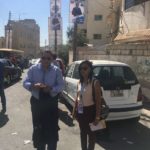Maat is following the Jordanian parliamentary elections with a mission of 15 international observers
The electoral process is smooth, free and fair
Violations of some candidates are the main drawbacks
Amman, 20 September 2016
In the context of its interest in electoral processes in the Arab region, Maat Foundation for Peace, Development and Human Rights participated in the follow-up of the Jordanian parliamentary elections that were held on September 20, with a delegation consisting of "15 international observers", after obtaining official permits from the independent supervising body On the electoral process.
The participation of Maat Foundation in the follow-up to the 2016 Jordanian parliamentary elections is the fourth of its kind, as the institution has previously followed up on the parliamentary elections that were held during the years 2009, 2010 and 2013, and it comes within the context of the continuous activity of Maat since 2006, which focuses on promoting democratic reform in The Arab region, by emphasizing the integrity and freedom of electoral processes, which made Maat interested in following-up more than 15 electoral processes in several Arab countries during this period.
The work of the Maat Foundation mission began during the propaganda phase included in the electoral process, as the mission was interested in holding meetings with a number of stakeholders and officials with the aim of evaluating the political frameworks within which the electoral process takes place, and in this regard the mission held a meeting with the Secretary General and officials of the Independent Commission supervising the elections And His Excellency the Minister of Political Affairs in the Hashemite Kingdom of Jordan, the mission also met with a group of representatives of the electoral lists, and a number of local Jordanian organizations concerned with monitoring the elections.


In terms of field follow-up during the voting process, the Maat Foundation mission was deployed in three governorates, namely the governorates of “Amman, Irbid,” and “Zarqa”
It is worth noting that the Jordanian parliamentary elections are conducted on the basis of the open proportional list system, whereby the kingdom is divided into 23 electoral districts, and candidates on lists compete for 115 seats in addition to 15 seats reserved for women, in accordance with the provisions of the law Law of Election to Parliament No. 6 of 2016.
The number of registered voters 4,130,145 (the percentage of men is 47.2% and the percentage of women is 52.8%), and the number of voters in the age group from 17 to 25 years old is 27.2%, and from 26-35 years of age 23.8%, and for those over 36 years, their percentage is 49%.
The number of competing lists is 226 electoral lists, and at the governorate level that the Maat Foundation mission covered, they are as follows:
1- The number of lists in the five departments of the Capital Governorate reached (60) a list of (355) male and female candidates
2- The number of lists in the four departments of Irbid Governorate reached (37), a list of (209) male and female candidates
3- The number of lists in the two districts of Zarqa Governorate reached (21), a list of (137) male and female candidates
In its first statement on the electoral process, the mission notes that there are remarkable legislative reforms that the Jordanian arena witnessed during these elections, as the current law was characterized by that it dealt with some inherent problems in the Jordanian electoral systems. “The controversial one vote, which has been in use since the mid-nineties, and the law guaranteed adequate representation of partisan and political forces through the adoption of the proportional list system, as well as that it included adequate representation of women and representation of some minorities in Jordanian society.
Also, the use of the automatic voter registration system instead of prior registration had a tangible positive effect on increasing the number of registered voters (almost double the number of registered voters during the previous elections).
At the level of the political context, the mission did not witness events that would negatively affect the electoral process, despite Jordan's suffering from refugee influxes during the past years, which left difficult conditions on the Jordanian economy.
On The level of field evidence, the voting process was smooth, and there were no violations of its freedom or integrity, but some violations were detected by a number of candidates and lists, perhaps the most prominent of which was the use of children in electoral campaigning in some areas, and we also monitored limited cases of candidates' supporters buying The votes of some voters (electoral bribes), as well as directing voters and practicing propaganda around polling stations in a way that may affect the will of the voters - in addition to mass transfers of voters.
Also, there was excessive use of speaking on the phone by some of the candidates' representatives inside the polling stations, and there was a great degree of fatigue evident on the committee officials and employees after the decision to extend voting for two hours.
The mission set aside a package of appropriate facilities to ensure that people with disabilities can access their right to vote, and the mission also monitored good use of technology during the voting process, which contributed to facilitating the voters, and we refer here in particular to the use of about 5,000 cameras to follow the counting process and broadcast it directly, which is what is considered To enhance the transparency of the electoral process.
In general, the Maat Foundation believes, through the observations of its field mission, that the Jordanian parliamentary elections, in which the polling stage ended yesterday evening Tuesday, corresponding to 20 September 2016, were characterized by a great deal of freedom and integrity, and largely express the will of the Jordanian voters.
shortlink: https://maatpeace.org/en/?p=19391





















